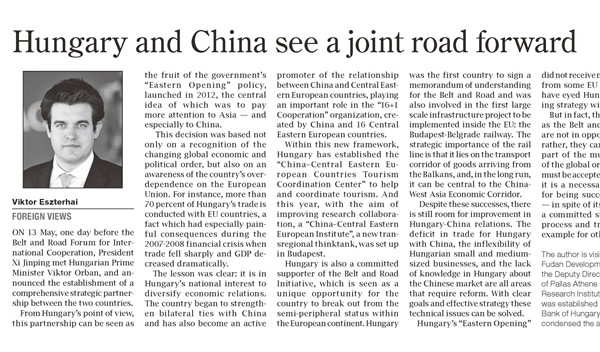Author: Release date:2017-06-27 15:45:46Source:发展研究院英文

ON 13 May, one day before the Belt and Road Forum for International Cooperation, President Xi Jinping met Hungarian Prime Minister Viktor Orban, and announced the establishment of a comprehensive strategic partnership between the two countries.
From Hungary’s point of view, this partnership can be seen as the fruit of the government’s “Eastern Opening” policy, launched in 2012, the central idea of which was to pay more attention to Asia — and especially to China.
This decision was based not only on a recognition of the changing global economic and political order, but also on an awareness of the country’s overdependence on the European Union. For instance, more than 70 percent of Hungary’s trade is conducted with EU countries, a fact which had especially painful consequences during the 2007-2008 financial crisis when trade fell sharply and GDP decreased dramatically.
The lesson was clear: it is in Hungary’s national interest to diversify economic relations. The country began to strengthen bilateral ties with China and has also become an active promoter of the relationship between China and Central Eastern European countries, playing an important role in the “16+1 Cooperation” organization, created by China and 16 Central Eastern European countries.
Within this new framework, Hungary has established the “China–Central Eastern European Countries Tourism Coordination Center” to help and coordinate tourism. And this year, with the aim of improving research collaboration, a “China–Central Eastern European Institute”, a new transregional thinktank, was set up in Budapest.
Hungary is also a committed supporter of the Belt and Road Initiative, which is seen as a unique opportunity for the country to break out from the semi-peripheral status within the European continent. Hungary was the first country to sign a memorandum of understanding for the Belt and Road and was also involved in the first large scale infrastructure project to be implemented inside the EU: the Budapest-Belgrade railway. The strategic importance of the rail line is that it lies on the transport corridor of goods arriving from the Balkans, and, in the long run, it can be central to the China-West Asia Economic Corridor.
Despite these successes, there is still room for improvement in Hungary-China relations. The deficit in trade for Hungary with China, the inflexibility of Hungarian small and medium-sized businesses, and the lack of knowledge in Hungary about the Chinese market are all areas that require reform. With clear goals and effective strategy these technical issues can be solved.
Hungary’s “Eastern Opening” did not receive much enthusiasm from some EU countries. Many have eyed Hungary’s diversifying strategy with suspicion.
But in fact, the new ideas such as the Belt and Road initiative are not in opposition to the EU; rather, they can be regarded as part of the multi-polarization of the global order — a fact that must be accepted by the EU, since it is a necessary precondition for being successful. Hungary — in spite of its small size — is a committed supporter of this process and tries to act as an example for other countries.
The author is visiting scholar at Fudan Development Institute and the Deputy Director of Research of Pallas Athene Geopolitical Research Institute (PAGEO), which was established by the Central Bank of Hungary. Shanghai Daily condensed the article.
For PDF version: Viktor Eszterhai-上海日报2017.5.22.pdf
Viktor Eszterhai-上海日报2017.5.22.pdf
Information about Fudan Development Institute Visiting Scholar Program